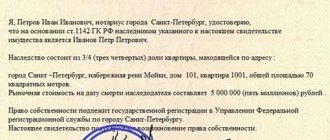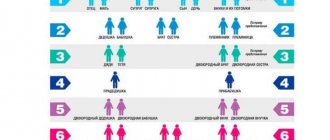The owner of the property can independently determine new owners for the property in the event of death. However, on the territory of the Russian Federation, the practice of drawing up an application is popular among older citizens. Early identification of owners of property at a young and mature age, without significant reasons (serious illness), is rare.
Therefore, the majority of citizens who receive the property rights of relatives are given this opportunity in accordance with the law. Who are the heirs by law?
general information
During his life, a citizen becomes the owner of a significant number of objects and things. In the event of his death, property objects are transferred to other persons by inheritance.
The Civil Code establishes the following options for transferring ownership of property of a deceased citizen:
- at the will of the owner (will);
- in accordance with legal regulations.
A will is a document in which a citizen disposes of property in the event of death at his own discretion. The law allows the owner to transfer property to any individuals and legal entities.
There are no restrictions for individuals. The heir does not have to be a relative, spouse or just an acquaintance.
The legal entity may be a municipal authority, a charity, a shelter or any other organization.
Important! The testator should not report to anyone, including a notary, why he made such a decision.
The will must be in writing and certified by a notary. After proper certification, the notary enters information about the document into the unified system of the federal notary service.
Inheritance in accordance with the law is possible in the following cases:
- there is no will;
- the document does not cover the full scope of property;
- the will is declared invalid or challenged in court;
- the heirs under the will refused to accept the property of the deceased.
Refusal of inheritance
Any person has every right to voluntarily refuse an inheritance. To do this, it is enough to write a corresponding application to a notary . Then his share of the inheritance is distributed equally among the other heirs in his line. But an heir who voluntarily renounces the inheritance may renounce it in favor of any specific person.
According to paragraph 2 of Art. 1157 of the Civil Code of the Russian Federation, the heir has the right to refuse the inheritance within the period established for accepting the inheritance - 6 months as a general rule, including in the case when he has already accepted the inheritance. If the heir has performed actions indicating the actual acceptance of the inheritance, the court may, upon the application of this heir, recognize him as having renounced the inheritance even after the established period, if it finds the reasons for missing the deadline valid.
- Refusal of inheritance cannot be subsequently changed or taken back (clause 3 of Article 1157 of the Civil Code of the Russian Federation).
- Refusal of inheritance in the case where the heir is a minor, incompetent or partially capable citizen is permitted with the prior permission of the guardianship and trusteeship authority (Clause 4 of Article 1157 of the Civil Code of the Russian Federation).
According to paragraph 1 of Art. 1158 of the Civil Code of the Russian Federation, the heir has the right to refuse inheritance in favor of other persons from among the heirs by will or heirs by law of any order, regardless of the call to inheritance, who are not deprived of inheritance, as well as in favor of those who are called to inherit by right of representation or by inheritance transmissions. Refusal in favor of any of the following persons is not permitted:
- from property inherited under a will, if all the property of the testator is bequeathed to the heirs appointed by him;
- from the obligatory share in the inheritance;
- if the heir is assigned an heir.
Refusal of inheritance in favor of persons not listed above is not permitted. Refusal of inheritance with reservations or under conditions is also not allowed (clause 2 of Article 1158 of the Civil Code of the Russian Federation). Refusal of part of the inheritance due to the heir is not allowed.
However, if the heir is called to inherit simultaneously on several grounds (by will and by law or by way of hereditary transmission and as a result of the opening of an inheritance, etc.), he has the right to refuse the inheritance due to him on one of these grounds, on several of them, or for all reasons (clause 3 of Article 1158 of the Civil Code of the Russian Federation).
Article 1159 of the Civil Code of the Russian Federation provides for the following methods of refusal of inheritance:
- Refusal of an inheritance is accomplished by submitting to an official at the place of opening of the inheritance a notary or a notary authorized in accordance with the law to issue certificates of the right to inheritance to an official of the heir’s application for renunciation of the inheritance.
- In the event that an application for refusal of inheritance is submitted to a notary not by the heir himself, but by another person or sent by mail, the signature of the heir on such an application must be certified in the manner established by paragraph two of paragraph 1 of Article 1153 of this Code.
- Refusal of inheritance through a representative is possible if the power of attorney specifically provides for the authority to do so . A power of attorney is not required for a legal representative to renounce an inheritance. According to Art. 1160 of the Civil Code of the Russian Federation, the legatee has the right to refuse to receive a testamentary refusal. In this case, refusal in favor of another person, refusal with reservations or under conditions is not allowed. In the case where the legatee is also an heir, his right provided for in this article does not depend on his right to accept or refuse the inheritance.
Refusal of inheritance: subtleties of the procedure and writing an application
The heir has the right to refuse the inheritance. How to file an application for waiver of inheritance in favor of other persons, how much does it cost and what are the pitfalls?
Contesting a will
Relatives learn the last will of the testator only after his death. It may turn out that he bequeathed his property to specific persons, and the heirs of the first priority were left deprived. They can use the will contest procedure and have clauses that violate their legal rights revoked.
- The surviving spouse has the right to demand the half of the joint property due to him, and thereby reduce the share of the heir under the will.
- A retired parent and a minor child are the owners of a compulsory share - in any case, they must receive half of the part of the inheritance due to them by law, even if it is bequeathed to another person.
If the testator wants to give, for example, an apartment to people who took the trouble to look after him or look after him during a serious illness, it is better for him to draw up a gift deed for it. Then this part of the property will not be included in the inheritance mass, and it will be more difficult to challenge it.
Void will
In the case where the deceased left one of his close relatives without an inheritance, the deprived person may try to prove the nullity of the testamentary document. A will has no legal force and will be considered void if the basic requirements for its execution have been violated:
- the signature of the second witness is missing;
- the document is not certified by a notary,
- the authenticity of the signatures is questionable,
- the names in the will do not correspond to the spelling of the names in the passport;
- lack of date and place of signing of the will, etc.
In such cases, the will is declared invalid without a trial.
Contested will
A correctly executed and notarized document can only be challenged in court. Grounds for legal action:
- there is evidence that the testator signed the document under the influence of threats or blackmail;
- the testator’s mental health was impaired, he was not aware of his actions;
- when drawing up his will, he used false information regarding potential heirs, who were slandered.
At the trial, the plaintiff (the disadvantaged person) must present evidence confirming the validity of his claims. The difficulty is that a will can only be contested after the death of the testator. Collecting certificates, witness statements, and circumstantial evidence regarding a deceased person is not an easy task.
It is best to file a claim to invalidate a will within 6 months after the death of the testator, until the heirs have assumed their rights and disposed of the property at their own discretion.
By law, heirs have the right to challenge a will document in court within a year.
The law limits proof of the nullity of a transaction to up to 3 years.
Order of heirs
The rules of law containing information about persons entitled to receive a share of the property of a deceased relative can be found in Chapter. 63 Civil Code of the Russian Federation. Let's look at the inheritance queue according to the law in more detail.
- Official spouse, adoptive parents or parents, adopted or natural children.
- Grandparents both on the part of each parent, as well as parents of adoptive parents, half-sisters and half-sisters.
- Siblings of mom and dad or adoptive parents.
- Mom and dad grandparents on both the father's (adoptive) and mother's (adoptive) sides.
- Brother and sister of grandparents, natural or adopted children of nephews and nieces.
- Blood and adopted children of cousins, grandchildren and granddaughters of brothers and sisters, nephews and nieces of grandparents.
- Stepdaughter and stepson, stepfather and stepmother.
Adopted children enjoy the right to inheritance on an equal basis with blood relatives. At the same time, guardians, wards, adopted children and parents do not have inheritance rights in relation to each other and relatives of the opposite party.
How do disabled dependents of the testator inherit?
Since questions about the order in which disabled people inherit and how dependents inherit by law are very relevant, the inheritance procedure for such persons should be described in more detail.
Disabled dependents of the testator are separated into a separate category of heirs by law. First, let's figure out who the disabled dependents of the testator are.
First of all, you need to understand that the category of disabled people includes:
- Minor children
- Citizens who have reached retirement age
- Disabled people of groups I, II or III
The second, legally significant fact - being a dependent of the testator full maintenance for at least one year , or systematic assistance, and this assistance was his main source of livelihood.
According to Article 1148 of the Civil Code of the Russian Federation, disabled dependents of the testator have an advantage over other heirs , namely, they have the right to inherit together with the heirs of the line that is called for inheritance, and inherit in equal shares, even if they are not included in the corresponding line of inheritance.
These heirs can be divided into two groups:
1) Disabled dependents of the testator, who are related to him and related to his legal heirs, but who are not included in the group of heirs of the same line that is called for inheritance. They can exercise the priority right of inheritance under the following conditions :
- By the time the inheritance was opened (the death of the testator), they were incapacitated
- At least one year before the opening of the inheritance (death of the testator) they were dependent on the testator, regardless of whether they lived together with him or separately from him.
2) Disabled dependents of the testator who are not related to the testator and, accordingly, are not included in any of the seven lines of his heirs by law. These persons inherit equally with the heirs called to inherit under the following conditions :
- By the time the inheritance was opened (the death of the testator), they were incapacitated
- At least one year before the opening of the inheritance (death of the testator) were dependent on the testator
- Lived together with the testator.
Let's take an example : if a disabled dependent of the testator is a third-priority heir, but there are first-rank heirs who are called by law to inherit, then the disabled dependent has the right to inherit together and equally with the first-rank heirs.
If a disabled dependent of the testator is included in the circle of heirs of the line that is called to inherit, then he inherits along with everyone else according to the general rules , while the mere fact that he is a disabled dependent of the testator does not increase his share of the inheritance, i.e. e. the shares of all heirs are considered equal.
If the testator does not have heirs of all seven lines, then his disabled dependents, who are not related to him and are not included in the circle of his heirs by law , inherit independently, in order of the eighth line of inheritance.
This is the procedure for inheritance by disabled dependents of the testator.
However, in practice, realizing the priority right of inheritance is not so simple. The fact is that if the heirs called to inherit dispute the fact that a person is dependent on the testator and do not agree that he has the right to inherit on an equal basis with them, then the disabled dependent will have to prove that he is dependent on the testator in court, since this this fact is one of the prerequisites for priority inheritance by law.
If such difficulties arise, you should definitely contact an experienced inheritance lawyer, since the legal process for the division of inheritance on the claim of a disabled dependent presents certain difficulties, requires clear evidence from the plaintiff, and this cannot be done without the knowledge and experience of a lawyer.
Lawyers work within the framework of an agreement for the provision of legal services and provide a full range of services in inheritance disputes of any complexity.
Experienced inheritance lawyer:
- Draw up and submit a statement of claim to the court
- Competently and skillfully represent your interests in court
- If necessary, appeal the judicial act and represent your interests in the court of appeal
- Will help at the stage of execution of a court decision
Consultation with a lawyer in the company’s office is carried out by appointment. Our inheritance lawyers will help in the most difficult situations.
WHO SHALL INHERIT ACCORDING TO THE LAW AND IN WHAT ORDER
The Civil Code of the Russian Federation establishes 8 stages of legal heirs.
First priority of heirs by law
The first priority heirs are the children, spouse and parents of the testator.
The testator's grandchildren and their descendants inherit by right of representation. The right of representation assumes that the share of an heir by law who died before the opening of the inheritance or at the same time as the testator passes to his corresponding descendants and is divided equally between them (Articles 1142, 1146 of the Civil Code of the Russian Federation).
When a marriage is dissolved by court, the testator's ex-spouse is deprived of the right to inherit if the corresponding court decision entered into legal force before the opening of the inheritance. If the marriage was declared invalid, including after the opening of the inheritance, the spouse of the testator is excluded from the number of heirs of the first priority by law.
Second line of heirs by law
Heirs of the second stage are full and half brothers and sisters of the testator, his grandparents on both the father’s and mother’s sides.
Children of the testator's full and half-siblings - nephews and nieces of the testator - inherit by right of representation (Articles 1143, 1146 of the Civil Code of the Russian Federation).
Third line of heirs by law
Heirs of the third stage are full and half brothers and sisters of the testator's parents - uncles and aunts of the testator. The testator's cousins inherit by right of representation (Articles 1144, 1146 of the Civil Code of the Russian Federation).
If there are no heirs of the first, second and third orders, the right to inherit according to the law is given to the relatives of the testator of the third, fourth and fifth degrees of kinship, not related to the heirs of the previous orders. The degree of kinship is determined by the number of births separating one relative from another. The birth of the testator himself is not included in this number (Article 1145 of the Civil Code of the Russian Federation).
Fourth line of heirs by law
Heirs of the fourth stage are relatives of the third degree of kinship - the great-grandfathers and great-grandmothers of the testator (clause 2 of Article 1145 of the Civil Code of the Russian Federation).
Who inherits first?
Let's look at how inheritance is distributed according to the law. The first order of inheritance includes:
- mother/father and adoptive mother/adoptive parent;
- husband and wife with whom the deceased was officially married at the time of death;
- natural and adopted children, including those for whom paternity or maternity has been established.
The mother and father have the right to claim the property of the child after his death, if at the time of the death of the minor or before the child reaches the age of majority, they were not deprived of parental rights in relation to him. The adoptive parent may use his right to inherit the adopted child if the adoption has not been canceled by court. In addition, the right to a share in the child’s property is lost by the person who has committed a crime against him.
A husband and wife have the right to a share in the property of the deceased spouse if at the time of his death they were officially married. The period of marriage does not matter. Even if the parties were married for 1 day, other heirs will not be able to challenge the decision of the deceased in court. The exception is when it is possible to prove forced marriage under threat of violence.
During marriage, property acquired with common money is considered joint. To determine the inheritance property, it is necessary to allocate the share of the property of the deceased in the joint property of the husband and wife. Only the share of the deceased is inherited. The second part remains to the spouse in full.
Children have the right to the property of their parents, even if the mother and father were deprived of parental rights in relation to them. It does not matter from what marriage the child was born, whether his parents were married. The main condition is the presence of a record of the father/mother in the civil status acts.
Important! If a man managed to challenge paternity before his death and the court decision came into force, then the child loses the right to the property of the deceased.
Deadlines for accepting an inheritance
The law limits the time allotted for submitting an application to a notary. This applies not only to the fourth stage, but to all heirs in principle. It is important to correctly understand the starting point. This is the day of opening of the inheritance case, i.e. the date of death of the testator indicated in the death certificate. If it is not possible to establish the moment of cardiac arrest, use the information specified in the act of declaring the person dead. Lastly, the date of announcement of the judicial act itself is taken into account.
All stages, including the fourth, have the right to go to court within three years and restore missed deadlines. In this case, the statement of claim must be accompanied by documents proving that the reason for the omission is objective, valid and relevant at the time of notarial inheritance activities. A new case is assigned. Previously issued certificates are cancelled, the property is transferred to the plaintiff of the fourth line of inheritance.
Six months
To exercise the right of inheritance, you must contact a notary within six months. If it is necessary to extend the inheritance case, the notary will do so, taking into account the fact that new circumstances require time. During this period, employees of the notary office will check the facts, establish the final circle of successors, and form the inheritance estate. Upon completion of the paperwork, a certificate is issued to re-register the property to the new owner.
Three months
This is exactly the deadline for accepting an inheritance if there are no heirs with whom you have to share. It is necessary to prove that there are no competitors and other contenders in principle and cannot be. To do this, relevant documents are attached to the application, serving as irrefutable evidence of these facts. Certificates, extracts, certificates and other documents that have legal force are used. Seek advice from a lawyer and he will help you complete the package of necessary documentation.
Second stage
To transfer inheritance according to the law, order is observed. The second line includes the following relatives:
- Brother;
- sister;
- grandmother;
- grandfather.
Half- and half-brothers and sisters have the right to the property of the deceased. The existence of a personal relationship between them does not matter. Step brothers and sisters (who do not have common parents) are not entitled to claim. An adopted child inherits the property of the blood children of the adoptive parents on an equal basis with blood brothers and sisters.
Grandparents on both the father's and mother's sides have an equal right to receive a share in the property of a deceased citizen. It does not matter if the parent has no rights over the child. This fact does not deprive his parents of the right to claim the property of their grandchildren.
Rules for the distribution of inheritance in queues
According to the provisions of articles 1113 to 1114 of the Civil Code, heirs of the second and other priority have the right to receive the property of the testator in the following cases:
- the notary has reliably determined that there are no heirs in the leading line (for example, they have died);
- all persons included in the main queue are deprived of the opportunity to receive an inheritance by court decision (for example, parents deprived of parental rights by the court; other unworthy heirs);
- all heirs in line are excluded from the right of inheritance, according to the will of the deceased;
- not a single heir accepted the property of the deceased;
- all applicants in the queue refused to receive the property of the deceased.
A special category of heirs by law is dependents
The law provides for special conditions for a certain category of relatives of the deceased. Moreover, regardless of the presence/absence of family ties between them. Dependents do not belong to a specific line of succession.
Dependents are understood as persons deprived of the ability to work due to being a minor or retirement age, or health status:
- a man over 60 years of age;
- a woman over 55 years of age;
- a child under 18 years of age;
- a citizen with a disability group;
- a person who retired due to special conditions (long service, hot net, mother-heroine).
Important! Dependents inherit in the order that comes into the inheritance, with the exception of the first.
Conditions for inheritance by dependents
A citizen who was dependent on the deceased must prove his right to a share in his property. To do this, you must provide the following information:
- ITU certificate, IPR of a disabled person;
- pension certificate or certificate from the state pension fund on the assignment of a pension;
- certificate of joint residence of the dependent and the testator in the same territory for a period of more than 1 year;
- information about being a dependent for a period of at least 1 year.
If the dependent was a blood or nominal relative of the deceased and had the right to inherit in one of the seven stages, then he does not have to provide information about joint residence.
Right of representation
In the order of inheritance by law, depending on the order of heirs, a scheme for transferring the right to acquire the property of the deceased in the event of the death of the heir is possible. This action is called the right of representation.
It gives the right to claim an inheritance share to persons who are heirs of citizens who receive a share in the owner’s property. These include the grandchildren and nephews of the deceased.
For example, a grandson may receive a share in his grandfather's property if his mother or father dies along with his grandfather or within 6 months of his death.
A feature of such inheritance is the obligation of all heirs of the deceased heir to divide his share among themselves.
Property acquired by right of representation is not subject to the terms of the will of the deceased heir.
Example. Sveta and Igor must divide their father’s property after his death by ½ share. But Igor dies 3 months after his father. By right of representation, his wife and two children inherit his share. Thus, the grandfather’s property is divided as follows:
- ½ share – Svetlana;
- ⅙ share for each of Igor’s heirs.
In addition, Igor drew up a will in which he transferred all his property to his son. These conditions do not apply to the grandfather's property.
Is inheritance possible by law in the presence of a will?
When drawing up a will, a citizen has the right to distribute in this way all his property, part of it, or determine the owner of one specific object, for example, an apartment. A will is valid only for the property that is expressly specified in it.
Important! The exception is the situation when the document contains the wording “All my property, wherever it is located and in what form it is expressed.”
If the testator has determined the fate of only part of the property, then the rules of inheritance according to the law apply to the remaining objects, in accordance with the order of inheritance.
In addition, the document can be:
- declared invalid by the heirs in court (disputed will);
- be invalid in accordance with the law (lack of notarization);
- recipients of property under a will have the right to relinquish their shares.
In such cases, the law applies to the property of the deceased.
Interpretation of the concept of heirs of subsequent queues
The Civil Code of the Russian Federation contains this concept, which is disclosed in the comments to Art. 1145 of the same legal act.
Current civil legislation, in particular the institution of inheritance, is primarily based on the principles of private Roman law. Thus, determining the degree of relationship between the testator and his descendants depends on the number of generations. The modern Civil Code of the Russian Federation provides a similar rule for determining kinship by counting the number of births that occurred after the birth of the testator himself and before the birth of the heir, the degree of kinship of which is to be established.
The presence of seven lines of inheritance is a novelty in the modern Civil Code, since previous versions of this act of lawmaking did not contain more than 4 levels.
Expanding the circle of persons by adding inheritance lines indicates the strengthening of the property rights of citizens, in particular one of the basic constitutional principles of the inviolability of private property.






